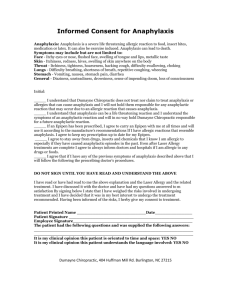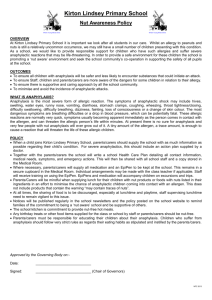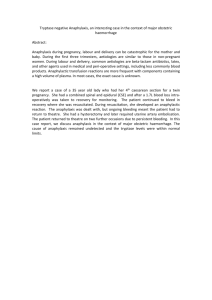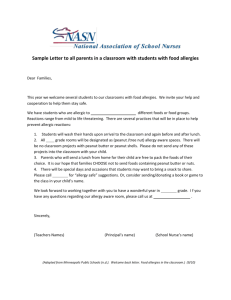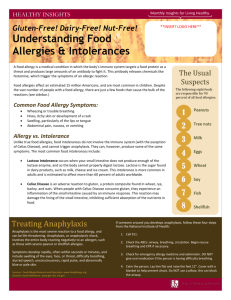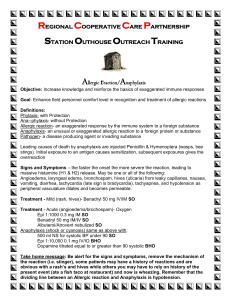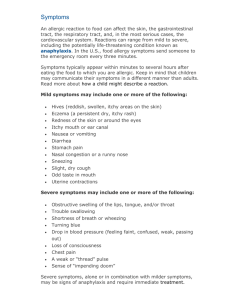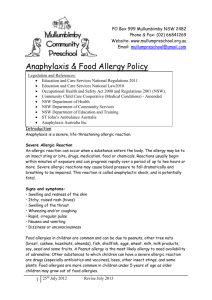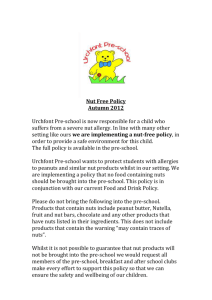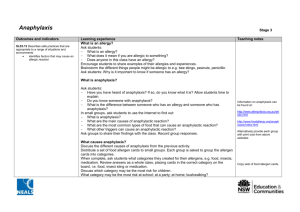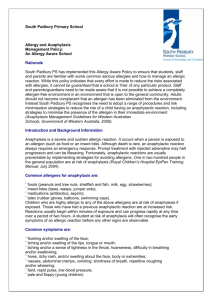Allergies Policy - McLaren Flat Primary School
advertisement
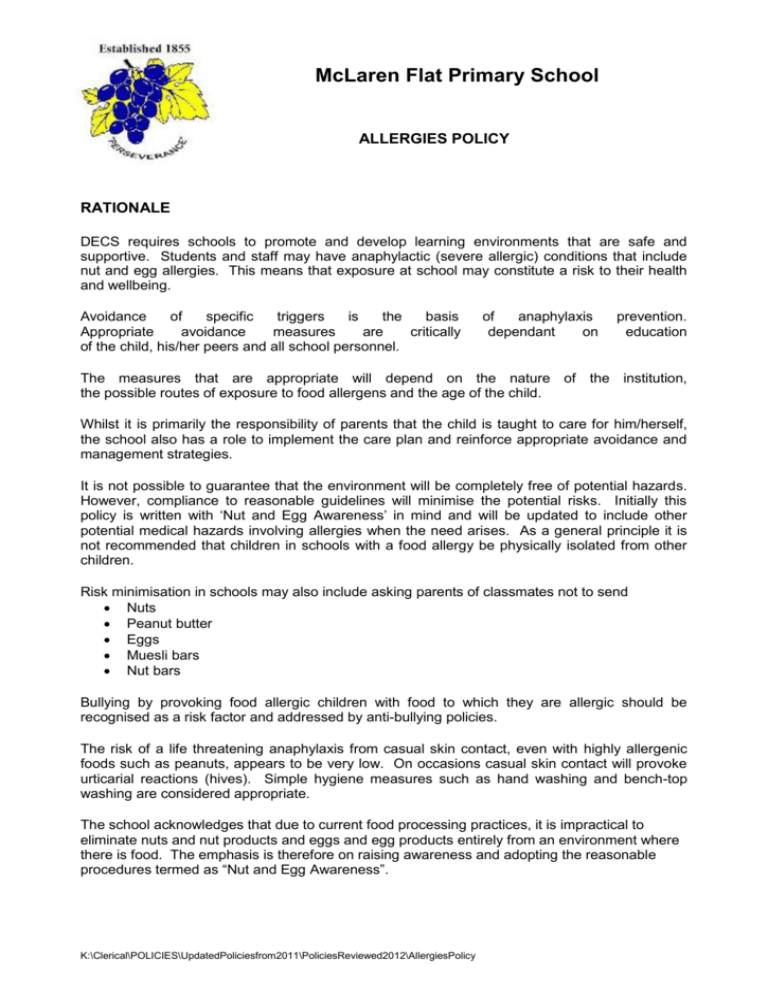
McLaren Flat Primary School ALLERGIES POLICY RATIONALE DECS requires schools to promote and develop learning environments that are safe and supportive. Students and staff may have anaphylactic (severe allergic) conditions that include nut and egg allergies. This means that exposure at school may constitute a risk to their health and wellbeing. Avoidance of specific triggers is the basis Appropriate avoidance measures are critically of the child, his/her peers and all school personnel. of anaphylaxis dependant on prevention. education The measures that are appropriate will depend on the nature of the institution, the possible routes of exposure to food allergens and the age of the child. Whilst it is primarily the responsibility of parents that the child is taught to care for him/herself, the school also has a role to implement the care plan and reinforce appropriate avoidance and management strategies. It is not possible to guarantee that the environment will be completely free of potential hazards. However, compliance to reasonable guidelines will minimise the potential risks. Initially this policy is written with ‘Nut and Egg Awareness’ in mind and will be updated to include other potential medical hazards involving allergies when the need arises. As a general principle it is not recommended that children in schools with a food allergy be physically isolated from other children. Risk minimisation in schools may also include asking parents of classmates not to send Nuts Peanut butter Eggs Muesli bars Nut bars Bullying by provoking food allergic children with food to which they are allergic should be recognised as a risk factor and addressed by anti-bullying policies. The risk of a life threatening anaphylaxis from casual skin contact, even with highly allergenic foods such as peanuts, appears to be very low. On occasions casual skin contact will provoke urticarial reactions (hives). Simple hygiene measures such as hand washing and bench-top washing are considered appropriate. The school acknowledges that due to current food processing practices, it is impractical to eliminate nuts and nut products and eggs and egg products entirely from an environment where there is food. The emphasis is therefore on raising awareness and adopting the reasonable procedures termed as “Nut and Egg Awareness”. K:\Clerical\POLICIES\UpdatedPoliciesfrom2011\PoliciesReviewed2012\AllergiesPolicy Nut and Egg Awareness AIM To raise the awareness of anaphylactic conditions for all members of the school community. To provide a safe school environment for all members of the school community. ACTION Parents of a child with an anaphylactic allergy: The initial step will be requiring medical information at the time of enrolment of children. This includes the provision of documentation by parents, including ASCIA Anaphylaxis Action Plan, which has been provided by a registered medical practitioner and includes the following: 1. Clear identification of the child (photo) 2. Documentation of the allergic triggers 3. Documentation of the first aid response including any prescribed medication 4. Identification and contact details of the doctor who has signed the action plan DECD Anaphylaxis (severe allergy) care plan, which has been signed by both a registered medical practitioner and parent. This plan includes a medication authority for any medication required in addition to the EpiPen e.g. antihistamines. All Parents/Carers: All water bottles, and food placed in fridges provided by the parents for their children will be clearly labelled with the name of the child for whom they are intended. Particularly parents of students in a class where there is an identified student with a severe allergic reaction are asked to speak with their child about not sharing food and drink and washing their hands after eating. Parents will be informed of this policy at the commencement of each new school year and at enrolment. Students There will be no trading and sharing of food, food utensils and food containers. Students with severe food allergies should only eat lunches and snacks that have been prepared at home or provided by parents/carers. Students will be encouraged to wash hands after eating. Students who bring food containing nuts or nut products, or eggs or egg products will be reminded not to share food and to wash their hands before going to play. Students with an allergy will be supervised by a teacher during eating times. K:\Clerical\POLICIES\UpdatedPoliciesfrom2011\PoliciesReviewed2012\AllergiesPolicy Staff - Education of carers Recognition of the risk and understanding the steps that can be taken to minimise food anaphylaxis by all those responsible for the care of children are the basis of prevention. Important topics that need to be addressed in the educational process are: 1. What is allergy? 2. What is anaphylaxis? 3. What are the triggers for allergy and anaphylaxis? 4. How is anaphylaxis recognised? 5. How can anaphylaxis be prevented? 6. What should be done in the event of a child having a severe allergic reaction? 7. Instruction on EpiPen® use. Education of all staff on these topics will be provided by appropriately qualified professionals such as allergy nurse educators, doctors or qualified first aid trainers and reinforced at yearly intervals. Staff will be made aware of students who have anaphylactic responses, including nut and egg allergies. Staff will supervise students during lunch eating time and will be vigilant in regards to this policy. The use of food in crafts, cooking classes and science experiments will be restricted depending on the allergies of particular children. Food preparation personnel will be instructed about measures necessary to prevent cross contamination during the handling, preparation and serving of food. Examples would include the careful cleaning of food preparation areas after use and cleaning of utensils when preparing allergenic foods. Staff will participate in training from Red Cross biennially to understand procedures related to Anaphylaxis (severe allergic reactions) as the need arises. Staff can also access training through the DECS Basic Emergency Life Support (BELS) first aid course. Staff – Documentation Staff will complete an individual student health support plan in consultation with the family. This plan will detail site management strategies such as storage of the EpiPen, arrangements for excursions, camps and other food related activities and emergency procedures. Promotion Promotion via the school newsletter. New families to the school community being informed via information in their enrolment package. Governing Council being informed and giving approval and support to this policy. Staff being informed and provided with training opportunities. Students being informed via teachers, signs and through the newsletter. Review This policy will be reviewed by staff and Governing Council every two/three years. K:\Clerical\POLICIES\UpdatedPoliciesfrom2011\PoliciesReviewed2012\AllergiesPolicy
